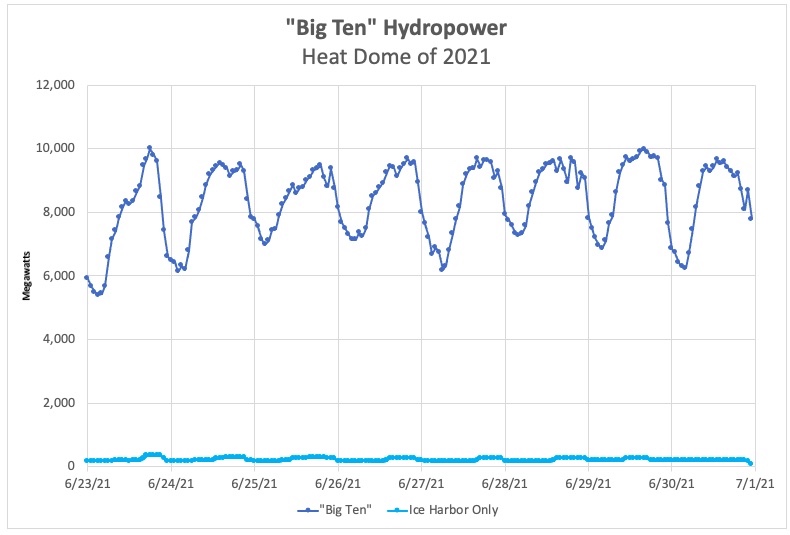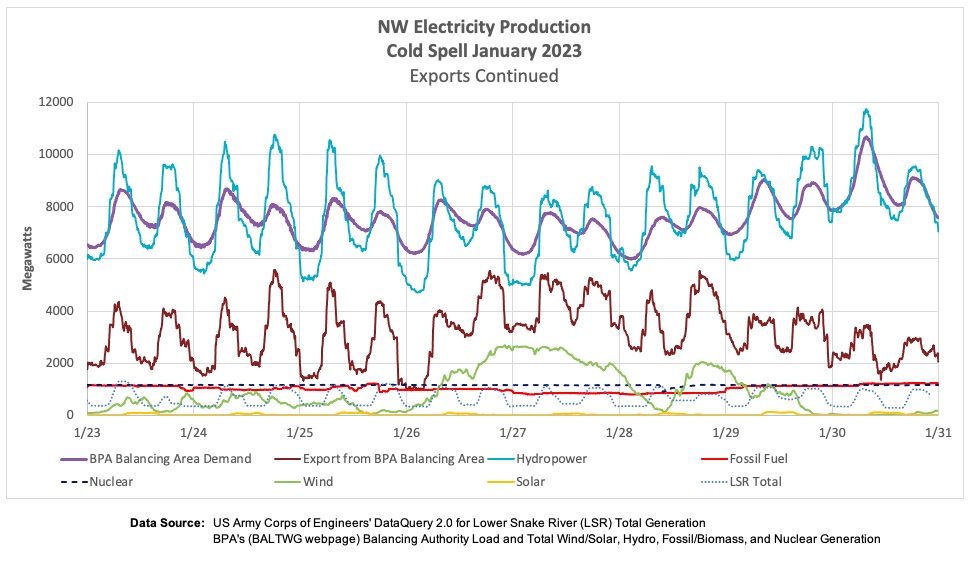forum
library
tutorial
contact

Lower Snake River Dams
Help Keep the Lights On
by Dave Markham
Bend Bulletin, April 28, 2023
|
the film forum library tutorial contact |

|
Lower Snake River Dams
by Dave Markham
|
Freilich implies I (Markham) overstated the importance of the
Lower Snake River dams to the region's clean energy future.
 Upon concluding my annual president's report to Central Electric Cooperative's members, I learned an uninvited non-CEC member, Jerry Freilich, sat in the back row to film my remarks discreetly and without permission. He left abruptly rather than stick around for the Q&A. Instead, he chose to write an op-ed that contains many misguided assertions.
Upon concluding my annual president's report to Central Electric Cooperative's members, I learned an uninvited non-CEC member, Jerry Freilich, sat in the back row to film my remarks discreetly and without permission. He left abruptly rather than stick around for the Q&A. Instead, he chose to write an op-ed that contains many misguided assertions.
In his op-ed, "Salmon won't survive unless lower Snake River dams are removed," Freilich implies I overstated the importance of the Lower Snake River Dams (LSRD) to the region's clean energy future. He also asserts, "reserve energy from renewable sources is already online to cover the dams several times over."
Freilich dismisses the Texas winter blackouts example due to the state's limited transmission to other regions. However, 11 states, including California, have experienced rolling blackouts since 2020 -- a disturbing trend.
The Pacific Northwest is not immune. Our region suffered through a heat dome in 2021, resulting in more than 500 heat-related deaths. This tragedy occurred with the grid in full operation -- no lost energy. But widespread power blackouts almost happened, as multiple Northwest utilities issued Energy Emergency Alerts as a precursor to possible blackouts. We were at the razor's edge.
The federal Bonneville Power Administration reported the LSRD prevented the blackouts as operators ramped them up to meet demand.
This wasn't a one-off event. The Western Electricity Coordinating Council (WECC), a nonprofit corporation, exists to ensure a reliable electric transmission system. WECC warned the entire Western United States is exposed to an unacceptably high risk for blackouts as soon as 2025.
According to a 2023 WECC report, utilities in the West experienced 10 "Level 3" Energy Emergency Alerts in 2022 -- the highest level before rolling blackouts are mandated. Of these alerts, the one that received the most attention was California's blackout warning in September 2022.
Again, the LSRD came to the rescue, increasing generation to prevent over 500,000 homes from losing power during a life-threatening heat wave.
Gov. Jay Inslee and U.S. Sen. Patty Murray, both Washington Democrats, recognize the challenges of meeting energy supply. They commissioned a federal-state process to examine if reasonable means exist to replace the Lower Snake River Dams' benefits. The report concluded breaching the dams is "not a feasible option in the near term," adamant the resource must be replaced before taking any action.
Clearly, there are not enough reserve renewable sources online to cover the dams several times over. Nor are there likely to be in the foreseeable future due to grid decarbonization mandates and efforts to electrify cars and home heating. Conservatively, these laws and policies require a doubling of the current amount of electric generation over the next 20 years.
Energy GPS, a leading energy analysis company, conducted a 2022 study and determined the region is 35 years behind in meeting grid decarbonization requirements. For example, Oregon has a 100% clean energy mandate by 2040, but even if we double the pace of renewable buildouts completed over the past decade, we're not likely to achieve the zero-carbon requirement until 2075. Notably, that figure assumes the Lower Snake River Dams are still operating. Without them? Add another five years to the timeline.
Removing the dams is not the panacea dam-removal advocates make of it. Breaching the LSRD won't help 72 of the 76 listed threatened or endangered Pacific salmon and steelhead populations in the Western U.S. and Canada, but it will worsen climate change for them. Climate change in the ocean environment is the single greatest threat to salmon survival along the West Coast of North America.
Freilich may return as an invited registered guest for next year's annual meeting. If he does, he can choose not to eat the farmed fresh salmon sandwiches and learn what it takes to keep the lights on.
Related Pages:
Salmon Won't Survive Unless Lower Snake River Dams are Removed by Jerry Freilich, Bend Bulletin, 4/14/23
Facts About the Lower Snake River Dams by Jerry Freilich, Bend Bulletin, 8/22/22
Related Sites:
Ice Harbor key to relieving transmission congestion in Tri-Cities BPA Press Release, 7/22/21
Post-heatwave analysis by BPA transmission engineers indicates, if Ice Harbor had not been generating, an unplanned loss of one of the key transformer banks would have caused a System Operating Limit exceedance. Also, the loss of a different key transformer bank would have pushed a facility to 98% of its capacity. ...

learn more on topics covered in the film
see the video
read the script
learn the songs
discussion forum
